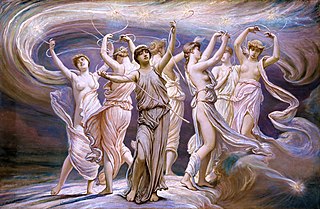Hyginus may refer to:
Hyginus may refer to:
In Greek mythology, Euryale was the name of several mythological figures, including:
In Greek mythology, Arcas was a hunter who became king of Arcadia. He was remembered for having taught people the arts of weaving and baking bread and for spreading agriculture to Arcadia.
In Greek mythology, Chrysothemis or Khrysothemis is a name ascribed to several female characters in Greek mythology.
In Greek mythology, several characters were known as Cycnus or Cygnus. The literal meaning of the name is "swan", and accordingly most of them ended up being transformed into swans.
In Greek mythology, Hyrieus was the eponym of Hyria in Boeotia, where he dwelt and where Orion was born; some sources though place him either in Thrace or on Chios. Most accounts speak of him as a king, although Ovid and Nonnus portray him as a peasant.
In Greek mythology, Pisidice or Peisidice was one of the following individuals:
Gaius Julius Hyginus was a Latin author, a pupil of the scholar Alexander Polyhistor, and a freedman of Augustus, and reputed author of the Fabulae and the De astronomia, although this is disputed.
Hyas, in Greek mythology, was a Boeotian who was regarded as the ancestor of the ancient Hyantes (Ὕαντες), who were the aboriginal inhabitants of Boeotia. His name means rain from hyô, hyetos.

In Greek mythology, Electra was one of the Pleiades, the seven daughters of Atlas and Pleione. She lived on the island of Samothrace. She had two sons, Dardanus and Iasion, by Zeus.

The Pleiades, were the seven sister-nymphs, companions of Artemis, the goddess of the hunt. Together with their sisters, the Hyades, they were called the Atlantides, Dodonides, or Nysiades, nursemaids and teachers of the infant Dionysus. The Pleiades were thought to have been translated to the night sky as a cluster of stars, the Pleiades, and were associated with rain.
In Greek mythology, the Hyades are a sisterhood of nymphs that bring rain.

Virgo is the sixth astrological sign in the zodiac. It spans the 150–180th degree of the zodiac. Under the tropical zodiac, the Sun transits this area between August 23 and September 22 on average. Depending on the system of astrology, individuals born during these dates may be called Virgos or Virgoans.
In Greek mythology, Eudora or Eudore was a name given to three nymphs:

In Greek mythology, the Danaïdes, also Danaides or Danaids, were the fifty daughters of Danaus, king of Libya. In the Metamorphoses, Ovid refers to them as the Belides after their grandfather Belus. They were to marry the 50 sons of Danaus' twin brother Aegyptus, a mythical king of Egypt. In the most common version of the myth, all but one of them killed their husbands on their wedding night and are condemned to spend eternity carrying water in a sieve or perforated device. In the classical tradition, they came to represent the futility of a repetitive task that can never be completed.
In Greek mythology, Clytus is a name that may refer to:

In Greek mythology, Erigone was the daughter of Icarius of Athens.
In Greek mythology, the name Clytie or Clytia may refer to:
In Greek mythology, the name Alke or Alce may refer to:
Cassiopeia or Cassiepeia, a figure in Greek mythology, was Queen of Aethiopia and wife of King Cepheus of Ethiopia. She was arrogant and vain, characteristics that led to her downfall.
Merope was originally the name of several characters in Greek mythology.